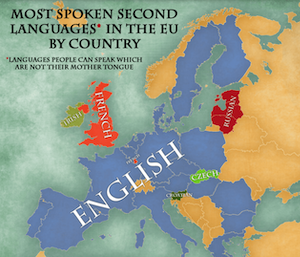Lee Kuan Yew, the founding father of modern Singapore, was a proponent of the English language as a tool for economic development and international communication. He believed that English, being the global lingua franca, especially in business and science, could serve as a bridge between different cultures and enhance a country’s competitiveness in the global market. Regarding Europe, Lee Kuan Yew recognized the continent’s diversity in languages and cultures but emphasized the practicality and benefits of adopting English as a common language to strengthen its position in the global economy. You can read more about Lee Kuan Yeahw here.
Ulbrich CEO of JLL – suggests making English the recognized lingua franca in business, instead of insisting on local languages. It would attract more of the world’s top talent, who often choose the U.S., Canada, or the U.K. instead. “When you go to Amsterdam, you rarely find someone who speaks Dutch anymore,” Ulbrich said. “But is that a problem? Not really.” Read more about Ulbrich here.
Europe has long been known for its diversity of languages and cultures. While this diversity is a source of pride, it also presents a challenge to the continent’s economic and political unity. In order to become the most powerful economy in the world, Europe must unite under one language, and that language should be English.
The benefits of a unified language are clear. Look at Dubai and Singapore, two small countries that have become economic powerhouses by embracing English as a common language. With a common language, these countries have been able to attract a highly skilled global workforce, facilitate trade, and build strong international partnerships. Europe can follow this example and create a more attractive destination for investment and talent.
In terms of language choice, no other language comes close to English, except perhaps Spanish or French. But English is already by far the most popular second language on the continent. Making English an official language of Europe that unites the country would be the choice that has the least friction, and bring the biggest benefit.
A common language can also help with the movement of labor within the EU. The free movement of labor is one of the fundamental principles of the EU, but language barriers can make it difficult for workers to move freely within the bloc. With a common language, EU citizens can more easily work and travel across the continent, creating a more dynamic labor market.
Another benefit of a common language is a unified education system. With a common language, students from all over Europe can study together, exchange ideas, and learn from one another. This would create a more cohesive and connected continent, with a shared understanding of each other’s cultures and values.
The cost of learning a new language is not insignificant. It’s estimated that it takes around 500 hours of study to become proficient in English. However, the benefits of a common language far outweigh the cost. A united Europe would be a more attractive destination for investment, talent, and tourism. It would also be more efficient, with a shared language reducing the costs of translation and interpretation.
The cost of not uniting Europe under one language is also significant. A lack of a common language creates inefficiencies in business, education, and government. It also makes it difficult for citizens to interact with one another, creating a sense of distance and disunity.
Brexit was a significant event that presented a challenge to Europe’s unity. However, it can also be seen as a test for the continent. If Europe can create a more attractive environment for investment, talent, and tourism, there wouldn’t need to be any debate or convincing, UK would be foolish not to come back. Adopting English as a common language in Europe could be a step towards this goal, making the continent a more accessible and unified destination. It’s important for Europe to rise to this challenge and create a more united, dynamic, and connected continent.
Europe has the potential to become the most powerful economy in the world. With a population of over 740 million and a GDP of over $18 trillion, Europe is already a significant economic force. If the continent can unite under a common language and shared values, it could become an even more powerful player on the global stage. By leveraging its strengths in technology, innovation, and sustainability, Europe could lead the way in shaping the future of the global economy. It’s important for Europe to recognize its potential and work towards creating a more united and powerful continent.
In conclusion, Europe needs a common language to unite, and that common language can be English. A common language will unite the continent and create a more dynamic, cohesive, and connected Europe. While there is a cost associated with learning a new language, the benefits far outweigh the cost. A united Europe will be a more attractive destination for investment, talent, and tourism, and create a more efficient and effective continent.
